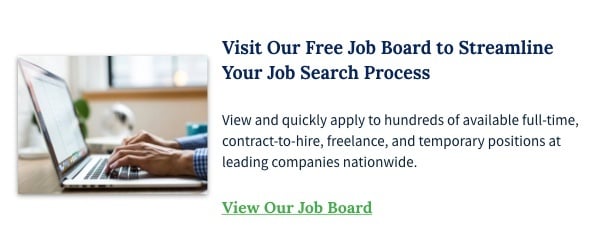
Traditionally, most job seekers target regular full-time employment. But today, the ‘gig economy’ is growing, with many job seekers acknowledging the benefits that freelance gigs, contract, and contract to hire employment can offer.
A recent study by McKinsey1 found that 162 million people in Europe and the United States are involved with contingent work, whether as freelancers, temporary, or contract employees, or those that seek short-term contracts for supplemental income. A contract to hire position might be ideal and can provide a job seeker with a variety of benefits, and may be a particularly positive experience for creative professionals.
How Contract to Hire Employment Benefits Creative Professionals:
Finding employment as a creative professional can be a significantly different experience from other professions. Evaluating creative talent is more subjective than evaluating other skill sets, so presenting your creative skills can be difficult, particularly for those new to the field.
The Top Challenges in Finding Employment as a Creative Professional are:
- Building a portfolio
- Articulating / demonstrating talent
- Targeting the right position
- Learning about the company and industry
- Leveraging your network
Candidates with limited experience in the creative realm, in particular, are at-risk for experiencing these challenges. By the time you have a few years of experience, you should have a good portfolio of work, a solid understanding of different positions in your field, and an extensive network of contacts that can help you find your next job. But if your creative resume is thin, contract to hire employment might be just what you’re looking for, allowing you to:
1. Demonstrate Your Talent
Creative talent is, by definition, subjective and difficult to quantify. Without a solid background of experience, how can you validate your skills to a potential employer? A contract to hire job gets you in the door, actually doing the job on a daily basis – giving you the opportunity to show the employer what you can do.
2. Fill In Gaps In Employment
It is rare to find a person whose career path follows a traditional, predictable journey. Gaps in employment are more prevalent, and more acceptable than they used to be.
However, when spending some time between regular jobs, it can be helpful to demonstrate how you, as a candidate, used that gap time to improve your skills or knowledge. A contract position can be an excellent way to create a cohesive resume, showing that you used the time between jobs productively.
3. Build A Portfolio
Not all contract gigs turn into regular full-time employment, although 47%2 of workers view contract or flex work as a stepping stone to regular employment. Even if a particular contract to hire gig doesn’t work for you, the work that you perform can be added to your portfolio and applied to securing your next job.
Related Reading: Navigate the Contract to Hire Process: 3 Ways to Land a Permanent Job.
4. Grow Your Network
You never know where your ideal job will appear, or who in your network will have the power to make a recommendation. View every person you meet in a contract to hire position as an opportunity to expand your network of contacts, and that this network can be leveraged in future job searches.
Related Reading: Networking Events: An Overlooked Job Hunting Method That Could Land You Your Next Job.
5. Targeting The Right Position
Particularly for someone just starting a creative career, it can be difficult to figure out what is the right position for you. Would employment as a graphic designer, visual designer, product, web, or UX designer be the best fit? A contract to hire gig can help you learn what different positions require in terms of skills and knowledge, and also what the daily task breakdown is like. Additionally, you will have the opportunity to see if a particular company culture and/or industry is an ideal match for your style and skill-sets as a creative professional.
The gig economy is growing, and more people are seeking alternative forms of employment including freelancing, temping, part-time and contract positions. Some appreciate the flexibility and variety it affords, while others see it as a path to their ideal position.
Contract-based employment is particularly useful for job seekers in creative fields, allowing them the opportunity to demonstrate a difficult-to-articulate creative talent, build a portfolio, and learn more about the jobs, companies, and industries that interest them.
To land a creative position, consider partnering with a staffing agency with expertise in placing creative professionals. Sparks Group is a nationally-awarded staffing agency with a proven track record of success in placing creative professionals in a variety of jobs, including marketing, advertising, design, writing, video production, and more.






